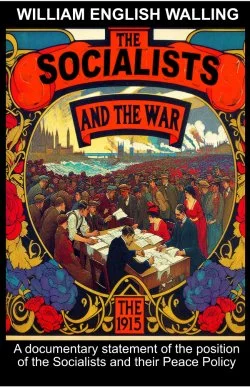The Socialists And The War
By William English Walling (Author), Colin Heston (Introduction)
William English Walling’s The Socialists and the War: A Documentary Statement of the Position of the Socialists of All Countries; With Special Reference to Their Peace Policy is a powerful and timely compilation that captures the ideological and political turmoil that gripped the international socialist movement during the First World War. Published in 1915, at the height of the global conflict, the book serves as both a historical record and a moral inquiry into how socialist parties and leaders across nations responded to the unprecedented crisis of global warfare. Walling, a prominent American socialist and journalist, undertakes the ambitious task of documenting the fractured responses of socialist organizations to the war, revealing both the strength and the fragility of international solidarity in the face of nationalism and militarism.
The introduction to this volume sets the tone for a work that is as much about disillusionment as it is about documentation. Walling begins by acknowledging the deep betrayal felt by many socialists when the war broke out and major socialist parties—particularly in Germany, France, and Britain—chose to support their respective national war efforts. This decision, in many cases, ran counter to the long-standing commitments of the Second International, which had pledged to oppose imperialist wars and to promote working-class unity across national borders. Walling does not shy away from the painful truth: that the war exposed the limits of internationalism and revealed the powerful grip of nationalism even within movements that had long claimed to transcend it.
A central theme of the book is the tension between socialist ideals and national loyalties. Walling presents a wide array of primary documents—speeches, party resolutions, manifestos, and editorials—that illustrate how socialist leaders justified their support for or opposition to the war. Some, like the German Social Democrats, argued that they were defending their nation against aggression; others, like the Russian Bolsheviks and a minority of Western European socialists, condemned the war as a capitalist enterprise and called for revolutionary opposition. Walling’s editorial voice is present throughout, guiding the reader through these conflicting positions and offering critical commentary on their implications.
Read-Me.Org Inc. New York-Philadelphia-Australia. 2025. 523p.


